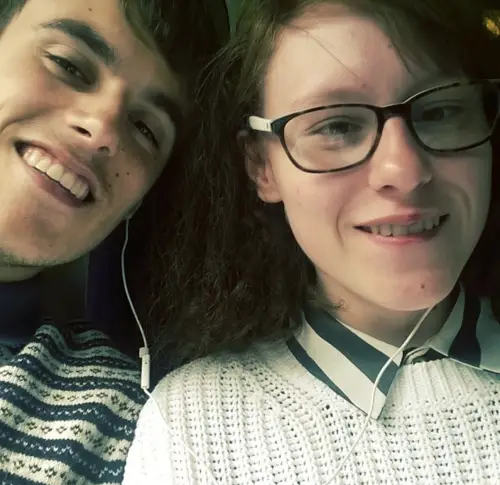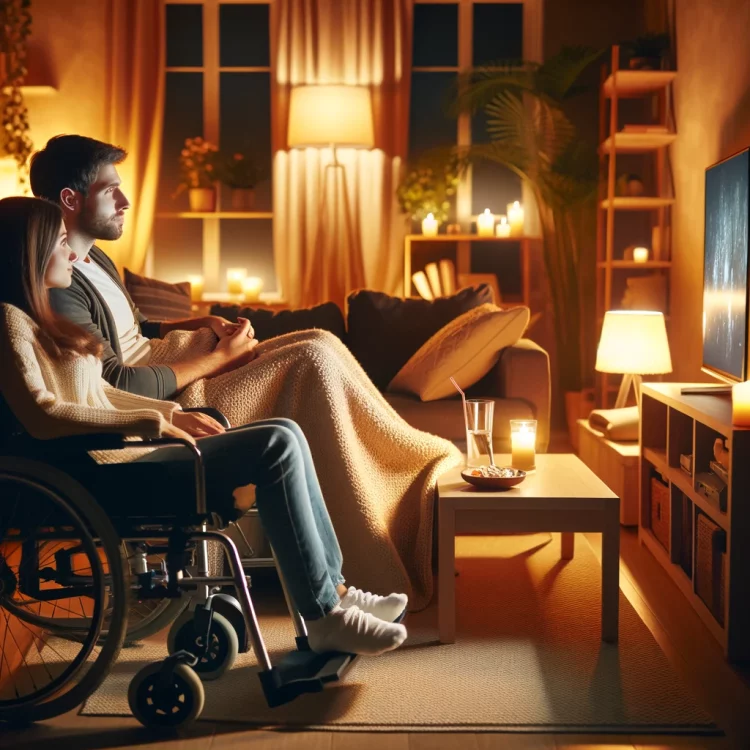
“Can you date someone with cerebral palsy?” Yes of course!
Dating someone with a disability is no different from dating a non-disabled person. If there is one thing the entire human race has in common, it is the ability to love and want to be loved. So, what makes disabled people any different? Absolutely nothing, and this article, along with the others in our series ahead of Valentine’s Day, will help to remove the misconceptions around dating someone with a disability.
Sam Harris, a freelance journalist who has cerebral palsy, talks about his experience dating with a disability. Sam has been in a long-distance relationship for seven years and beautifully illustrates that dating someone with a disability has enriched his life. Sam wants to address the common misconceptions and show the reality of dating with a disability.
I have often heard the question asked: “Can you date someone with cerebral palsy?” From my own experience, I can confirm that you absolutely can. There are many relationships, including my own, where both people are disabled.
For disabled people, comments don’t end there. Another common one is, “Are you his carer?”
Comments such as these can be very degrading, as it implies that a person accompanying someone with a disability is there purely to look after them. Many people can’t see past this and understand that the person’s relationship may be deeper.
Building relationships using social media
At school, I was often shy in social situations but I still had a tight-knit group of friends. Some of my friends were in relationships, but by the time I was nearing the end of my school days, I still hadn’t had a serious long-term one.
In 2010, I joined HemiHelp, a Facebook group for people like myself with hemiplegia to talk about situations they had encountered.
The group was useful as it gave me a chance to meet people with similar conditions as me and share experiences. Many of the posts were relatable, from not hitting milestones to struggling to function in the cold weather.
During this time, I met a girl called Ella and I suddenly learnt we had lots in common – not just our disability.
Like me, she was also a twin and loved football. Strangely enough, she was born just two days before me, so naturally, we hit it off from the start.


Online dating with a disability
When I started online dating, talking to strangers online was quite unusual. I also had plenty of friends and family who were wary of my decision. But, I knew from our conversations that we would be great in each other’s company.
However, there was just one problem – she lived over three hours away from me, but that didn’t faze us. In the early days, we would speak endlessly on the phone or on social media until the early hours.
After two years of talking to each other online, we decided to meet up for the first time. Rather fittingly, our first date was a football match between our favourite teams, Leeds and Watford. Overall, I think it worked out well that it finished as a dramatic 3-3 draw!
That first night we stayed up until 4 am just chatting, as though we had known each other our whole lives. It felt natural for us to start our relationship officially the week after.
My first serious relationship being long-distance was a challenge, particularly as I didn’t know anyone in the same situation. At times, it was difficult not being able to help each other in person.


Maintaining a healthy long-distance relationship
It’s been seven years since Ella I started our relationship and although we still haven’t managed to close the distance, our relationship is stronger than ever.
We have had some amazing experiences together, including holidays in Barcelona and Berlin. We also attended the 2019 Para-swimming World Championships in London.
It has been difficult at times not knowing when we will see each next. The lockdown has made it very difficult to meet up, but we usually plan to see each once a month over a weekend.
With Ella being visually impaired coupled with her anxiety and depression, this means she does often have down days. But, it is really comforting that we have always been able to tell each other how we feel without the fear of being judged.
Since being together, we have learnt so much about our disabilities. I feel that our relationship has been strengthened by our disabilities, which has brought us closer together.
I have also learnt more about myself during this time, and how to adapt to others. For example, it has taught me how to guide someone who is visually impaired, including what not to say, for example: “It’s over there” and simply pointing.


Top tips for dating someone with a disability
- Be honest with each other and always be open about how you are feeling.
- Make sure you help each other equally so that there is not a situation where one of you feels like a burden and feels bad for their other half needing to help them so much.
- Be understanding. It is perfectly okay to have rest days and sometimes just being together watching Netflix is an acceptable way to spend the day.
- Ask how you can help your partner and be respectful if they don’t always want to talk about what is on their mind.
- Be aware that the nature of some disabilities/conditions means that people can be full of energy one day and lethargic the next. Complete understanding and compassion showing that this is not their fault are crucial in maintaining a healthy relationship.
By Sam Harris
Updated 2024
Dating Someone with Cerebral Palsy: What You Need to Know
If you’re dating someone with cerebral palsy, you likely have questions about what to expect and how to make the relationship work. While every person and relationship is unique, here are some key things to know when your partner has CP.
1. Cerebral Palsy Varies Widely in Severity
Cerebral palsy is a group of disorders that affect movement, balance and posture. But the way it manifests and the degree to which it impacts a person’s life varies significantly from one individual to the next.
Some people with CP can walk independently, while others use mobility aids like walkers or wheelchairs. Speech abilities also range from unaffected to severely impaired. Many people with CP have normal intelligence, while some have cognitive impairments.
The point is, don’t make assumptions about what your partner can or cannot do based on their diagnosis alone. Get to know them as an individual.
2. Provide Support While Respecting Independence
Your partner with CP may need help with certain physical tasks, but avoid falling into an overprotective “caretaker” role. Yes, their ability to help with some chores may be limited, but they can and should support you in other ways.
People with CP want to maintain as much independence as possible. Be patient and let them do things for themselves, even if it takes longer. Only provide assistance when needed and requested.
3. Plan Accessible Dates
When planning dates, ensure the destination is accessible if your partner has mobility limitations. Call ahead to ask about wheelchair ramps, accessible bathrooms, barrier-free pathways, etc.
Focus on activities you both enjoy and can participate in fully. With some advanced planning, there are many adapted sports, outdoor adventures, cultural events and travel destinations you can experience together.

4. Educate Yourself
Learning more about cerebral palsy can help you better understand your partner’s condition and how to support them. Ask them to share their experience and what CP means for them specifically.
However, if your partner’s cerebral palsy was caused by medical negligence during birth, the topic may be more emotionally charged. In these cases, many families pursue justice and financial security by working with an experienced cerebral palsy lawyer.
While your partner may not want to discuss the details of a legal case, educating yourself on this aspect can help you empathize with the challenges they and their family have faced. Just follow their lead on if and how much they want to talk about it.
5. Communicate Openly
As in any relationship, open and honest communication is key when dating someone with cerebral palsy. Create a safe space to discuss both of your needs, desires, fears and boundaries around physical intimacy and the relationship as a whole.
If you have questions, ask respectfully. If accommodations need to be made, problem-solve together. Above all, focus on enjoying each other’s company and building a meaningful connection, just like you would with any other partner.
With some education, planning, and open communication, a relationship with a partner who has CP can thrive. Embrace your differences, support each other’s needs, and enjoy all the wonderful things you have in common.
Cerebral Palsy Prevalence and Risk Factors
Cerebral palsy is the most common motor disability in childhood, affecting about 1 in 345 children in the United States. The global prevalence of CP ranges from 1 to nearly 4 per 1,000 live births.
Some key risk factors for CP include:
- Low birth weight: Babies weighing 3-5 pounds at birth are twice as likely to have CP, while those under 3 pounds have a prevalence rate nearly 60 times higher than normal birth weight babies.
- Prematurity: Babies born before 37 weeks have significantly higher rates of CP, with prevalence as high as 79.5 per 1,000 for those born at 28-31 weeks[.
- Multiple births: Twins, triplets and other multiples have a higher risk of CP.
- Maternal infections, birth complications, and brain damage early in development can also increase CP risk.
While rates have remained relatively stable over time, racial disparities persist, with CP prevalence about 1.8 times higher among Black children compared to white children in the U.S. More research is needed to understand and address these inequities.
Disability Rights and Accommodations
In the U.S., the Americans with Disabilities Act (ADA) prohibits discrimination and ensures equal opportunities for people with disabilities in areas like employment, education, transportation, and public accommodations. The ADA requires “reasonable accommodations” be made so that people with CP and other disabilities can fully participate in society.
For example, the ADA mandates that public spaces like schools, businesses, and government buildings be accessible, which may mean providing ramps, elevators, adapted restrooms, accessible seating, and more. In the dating world, this means restaurants, movie theaters, parks and other common date spots should be equipped to accommodate wheelchairs and other mobility aids.
The ADA also requires employers to provide necessary accommodations for workers with disabilities. So if you or your partner need assistive technology, a modified work schedule, or other adaptations to fulfill your job duties, your employer must work with you to implement them.
Knowing your rights under the ADA can help you advocate for the accommodations you and your partner need to fully access your community and pursue your goals as individuals and as a couple. Don’t be afraid to speak up and file a complaint if you encounter discrimination.
Barriers to Accessing Care and Resources
Unfortunately, many people with CP, especially those with more severe impairments, face barriers to getting the healthcare and support they need. Inadequate insurance coverage, high costs, lack of trained providers, inaccessible facilities and equipment, and limited community-based services can all impede access to quality care.
In USA, Medicaid is the largest payer for people with disabilities, but its funding has not kept pace with the growing demand for home and community-based services. As a result, hundreds of thousands languish on waitlists for critical assistance. Staffing shortages due to low wages further strain the system.
Families often struggle to find and afford the array of medical, therapeutic, assistive technology, educational and social services their loved ones with CP need to thrive. Caring for a child with CP can cost $1 million or more over their lifetime.
Nonprofit organizations like United Cerebral Palsy and the Cerebral Palsy Foundation can connect you to resources and support. Advocacy is essential to push for policies that expand access to healthcare, education, employment, housing and transportation for people with CP and other disabilities.
By knowing your rights, exploring your options, and advocating for your needs, you and your partner can work to overcome barriers and build a fulfilling life and relationship together. With the right accommodations and support, CP doesn’t have to hold you back from pursuing your dreams.
Dating Someone with Cerebral Palsy FAQS
What should I know about cerebral palsy when dating someone with this condition?
How can I support my partner with cerebral palsy in our relationship?
What are accessible date ideas when dating someone with cerebral palsy?
How can I better understand my partner’s experience with cerebral palsy?
Is it okay to ask my partner about their disability when dating someone with cerebral palsy?
How do we handle physical intimacy when dating someone with cerebral palsy?
What are some misconceptions about dating someone with cerebral palsy?
How can I deal with others’ misconceptions or rude comments when dating someone with cerebral palsy?
What legal protections support dating and relationships for people with cerebral palsy?
How can we maintain a strong relationship despite the challenges when dating someone with cerebral palsy?
More on Disability Horizons…
- Discover the dating app for people with autism
- Dating with a hearing impairment
- “Can you have sex?” and other common disability and dating questions
- Find useful dressing aids to excel your independence on the Disability Horizons Shop